|
What are the most recent developments regarding the threat of terrorism.
The most notable development has been the May 2011 U.S. military strike against the compound housing Osama Bin Laden. The attack resulted in the killing of Bin Laden and other residents of the compound. The attack culminated a nearly decade long search for the notorious leader of Al-Queda following the coordinated terrorist attacks by Al Queda against the U.S. on September 11, 2001.
Although Al-Queda is only one of many organizations which has been associated with Arab-extremist terrorism but it has unquestionably been of the most concern. They either have caused or have been strongly suspected to have caused many deadly incidents throughout the world. 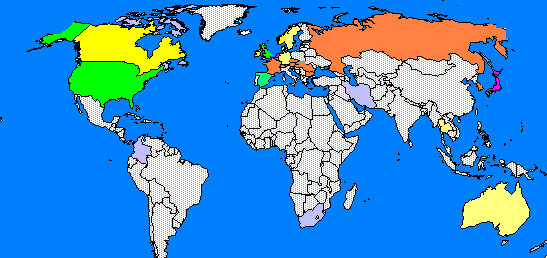 (Click map to review terrorist activity) Thus the successful elimination of the leader of this organization has been regarded as a major achievement. It remains to be seen whether the remaining members of the organization will be able to continue operations and avenge Bin Laden's death. (Click map to review terrorist activity) Thus the successful elimination of the leader of this organization has been regarded as a major achievement. It remains to be seen whether the remaining members of the organization will be able to continue operations and avenge Bin Laden's death.
Since the tragic events of September 11, 2001, the threat of terrorism has become a major preoccupation in the United States and to a somewhat lesser degree in the rest of the world. Shortly after the World Trade Center bombings, the U.S. launched an invasion of Afghanistan to overthrow the Taliban regime which had tolerated the presence of Al Queda in that country. This was accomplished and a new government was installed. But instability remained in that region and the Taliban regained control of areas near the Pakistani border. President Obama upon his elected renewed the U.S. determination to assist the Afghani government in ridding Taliban and Al Queda influence in the country. Operations continue in Afghanistan with mixed success and significant casualties. 
What was the aftermath of the September 11, 2001 attack?
Since September 11, there have been no major publicized subsequent acts of terrorism in the United States although the government frequent issues warnings that attacks are imminent. Because of the secrecy associated with the intelligence which has provoked such warnings, it is virtually impossible to evaluate the gravity of such threats. It is also possible that terrorist incidents have not been publicized in order to prevent panic or to deny terrorists the ability to claim success.
President Bush established a cabinet-level Homeland Security Agency to coordinate anti-terrorist efforts and substantially increased funding for anti-terrorism activities.
In the wake of revelations regarding intelligence breakdowns prior to the attacks, a new cabinet-level agency, the Department of Homeland Security, was created. The new Department essentially involved a reorganization of existing agencies but the reorganization did not affect the primary intelligence gathering agencies within the federal government: the CIA, the FBI, the National Security Agency, and the branches of the armed services.  . The new agency is also responsible for coordinating emergency responses to terrorist acts and is thus the parent agency of FEMA, the federal emergency response agency. The operations of DHS have thus come under considerable attack in the aftermath of FEMA's delayed response to the devastation of Hurricane Katrina. . The new agency is also responsible for coordinating emergency responses to terrorist acts and is thus the parent agency of FEMA, the federal emergency response agency. The operations of DHS have thus come under considerable attack in the aftermath of FEMA's delayed response to the devastation of Hurricane Katrina.
A bipartisan commission was created to investigate what could have been done to prevent the tragedy and what could be done to prevent future similar events. In a report issued in July 2004, the 9/11 commission found that many errors helped lead to the 9/11 tragedy. The hijackers had repeatedly broken the law in entering the United States, intelligence agencies had considered the threat of suicide hijackings, and Mr. Bush received an August 2001 briefing on evidence of continuing domestic terrorist threats from Al Qaeda. The commission found that an attack described as unimaginable had in fact been imagined, repeatedly. The commission said that several threat reports circulated within the government in the late 1990's raised the explicit possibility of an attack using airliners as missiles. The commission also found that bin Laden had financed Al Qaeda's operations through a core group of wealthy Muslim donors, mainly in the Persian Gulf. Most alarming, the FBI was warned about Arab students who had enrolled in flight schools, including one who indicated no intention of learning to land a plane. But this development did not result in any measures which could have prevented the event.
The commission's report listed specific to combat future acts of terrorism. Perhaps the most controversial recommendation was the call for the appointment of a cabinet-level director of intelligence with control over the CIA, the FBI, and the country's dozen other intelligence agencies to improve US ability to disrupt future terrorist attacks. Also recommended was stronger cooperation with the rest of the world in anti-terror efforts, an acceleration of economic development policies in the Arab world and a reexamination of the relationship of the U.S. with Saudi Arabia. The Bush Administration indicated a willingness to establish an intelligence oversight post but not with the expansive authority recommended by the Commission. Ultimately, no major changes in the structure of the intelligence agencies occurred.
The most important U.S. response to the September 11 events has been an increased interventionist role in the Middle East. In addition to the Afghanistan intervention, the Arab terrorism involved unquestionably prompted the U.S.-led invasion of Iraq in order to remove Sadaam Hussein from power despite the fact that there has never been an established direct link between the Iraqi government and Al Queda. Sadaam Hussein was the only world head of state to publicly express support for the attack. The amount spent on the military operations has been significant  and has been much greater than the expenditures on internal security. and has been much greater than the expenditures on internal security.
What are the general implications of modern terrorism?
With the decline in Cold War tensions, many military experts now consider terrorist activity as perhaps the greatest threat to world security. The possibility that terrorists could have access to weapons of mass destruction means that small bands of criminals fortified by rogue nations could conceivably have the ability to exert extensive global influence and destruction. This is a scenario not unlike those portrayed by Ian Fleming's James Bond novels decades ago.
Much of the terrorist activity comes from organizations and countries in the Middle East. Is there a common motivation?
The common thread appears to be a concern with the impact of western values and culture on Islamic traditions. Movies and television entertainment which display such values are considered evil. There is particular concern about issues concerning sexual morality and the status of women. Although most Muslims are not fanatical and deplore the tactics of terrorists, the anti-Western sentiment has widespread popular political appeal in all of these Islamic countries. There is particular animosity with Israel mainly because this Jewish state is "westernized" and because it is geographically situated in the heart of the Islamic worl In the wake of the Iraqi invasion and occupation, negative Arab attitudes toward the U.S. have intensified further. 
What is the likelihood that these and other terrorist organizations can use weapons of mass destruction?
This issue has been a policy concern. Osama Bin Laden has publicly pronounced that acquiring weapons of mass destruction, chemical, biological, radiological, and nuclear (CBRN), is a religious duty. The threats are the following:
Nuclear weapons There is no persuasive evidence that the terrorist organizations possess nuclear weaponry or the means to deliver such weapons. However, both the United States and the Soviet Union developed portable "suitcase" nuclear weaponry during the cold war. Due to the secrecy involved with the development and locations of this weaponry, it is difficult to determine with certainty that all such devices are accounted for. Pakistan does have a limited nuclear capability but the threat of terrorist use of this weaponry is remote. Chemical weapons These are agents such as the sarin gas used by an extremist organization in the Tokyo subway attack. There is no evidence at this point that terrorist organizations have the ability to cause mass destruction through the use of this weaponry because they are not believed to have weapons which could efficiently deliver such chemicals. Biological weapons These are agents which spread infectious diseases and are considered a real and evolving threat by experts. The are potentially horrendous weapons whose damage can range from catastrophic pandemics to
economic disasters. They are technologically easy and inexpensive. They can be, and have been,
manufactured by individuals, groups, or nations. Until September 11, 2001, there had been no instance
of mass destruction of civilian life. With the strike against the World Trade Center and Pentagon, we
know that terrorists, perhaps state-sponsored, have passed a threshold; it is now plausible, perhaps
inevitable, that biological weapons will be used in the future. While nations might be deterred from overt use of these weapons,
terrorist use and covert use by nations are now highly significant threats.
In the two months subsequent to the September 11 attack, the biological threat became a reality through letters mailed with anthrax to journalists and politicians. There were five fatalities. These attacks resulted in the closure of the Hart Senate office building for more than six months. There has been very little public disclosure regarding the investigation of the possible perpretrators of these attacks. The focus has apparently been on labs in the United States because of the identification of the strain that was used although the timing and messages associated with the mailings point to Arab involvement. No one has yet been identified as responsible for these attacks. If there have been any further instances of biological terrorism, they have not received any press coverage.
Biological weapons can be delivered through several, different means, ranging from using people as carriers of the disease (including person to person infections), covert dissemination such as aerosolization, or via missile. It is unclear whether the known terrorist organizations have the capacity to develop and deliver these agents.
It could take days, or even weeks, for the symptoms of a biological agent to begin to manifest themselves. In the case of a BW attack, the first responder is likely to be a primary care physician, healthcare provider, veterinarian, agricultural services inspector, or perhaps an entomologist. Given the unheralded nature of these silent killers, it would fall upon the public health and medical communities to detect the attack, contain the incident, and treat the victims. Experts believe that the United States is inadequately prepared and underequipped and resourced to deal with bioterrorism. In particular, they maintain that the biomedical, public health, and human services communities are under-equipped, under-informed, and ill prepared for a biological attack and for infectious disease in general. Legislation authorizing $4.3 billion for drugs, vaccines, training and other initiatives to deal with a bioterror attacks was signed in June 2002. This legislation calls for tightening security at water plants, improving food inspections, and increasing stockpiles of vaccines against smallpox and other diseases. It also provides $1.6 billion for states to aid with emergency preparedness. Use of hijacked aircraft The fully fueled aircraft which exploded into the World Trade Center and Pentagon must be considered another type of weapon of mass destruction. It is highly unlikely that there will be a repetition of this event because a key element to the success of this tactic was that it was not anticipated.
What efforts have been made to combat terrorism?
Combating terrorism involves a variety of policies and activities:
- Economic Sanctions The U.S. maintains an official list of countries involved in state-sponsored terrorism. This list presently consists of Iran, Syria, Sudan, and Cuba. These countries are subject to U.S. economic sanctions because of their support for terrorism although in the case of Cuba, the policy may be rooted in other objectives. The UN has also imposed sanctions on Libya and presently Afghanistan because of terrorist policies. It is generally agreed that UN economic sanctions have been effective in reducing Libya's sponsorship of terrorism.
- Preemptive military strikes by the U.S. have been directed at Libya, Iran, Iraq, and Sudan for purposes of retaliation and destruction of terrorist capability. Some of these missions have not succeeded and in any event, they have clearly not uniformly deterred further acts of terrorism.
- Preparedness and security measures have actually been quite successful in deterring some types of terrorist activity. In particular, airline security measures have kept guns and bombs off aircraft. The success of the terrorist hijacking attack on the World Trade Center and Pentagon was not due to a security failure, but rather the failure of the intelligence community to anticipate this type of event and make design changes in aircraft which would prevent such attacks. These adjustments almost certainly will now occur and will be successful in preventing similar attacks. Funding has been in place for stockpiling vaccines to prepare for a possible chemical or biological weapon attack.
- Intelligence involves infiltrating terrorist groups, intercepting their communications and anticipating the types of terrorist activity. Infiltrating these groups is difficult and has not been successful although many intelligence experts are now saying that more resources must be devoted to this activity. The volume and ease of modern communication, especially through use of the Internet, makes the electronic interception of terrorist communications very difficult. It is quite apparent that the method of attack used at the World Trade Center and the Pentagon was a complete surprise. The failure to anticipate this tactic by intelligence experts has to be regarded as a major and costly failure. The disclosures in the aftermath of this disaster indicate that the intelligence community did have sufficient information to anticipate the attacks but did not correctly process and act on the information that it had. To a certain extent, this costly failure was the result of a longstanding failure of the FBI and CIA to share important field information. This deficiency is key to the primary recommendation of the 9/11 Commission to establish a overall intelligence umbrella agency.
Some of the above efforts are costing Americans more than money - to a certain extent it has been at the expense of civil liberties. Already, Arab-Americans have been subject to detentions and surveillance which has led to charges of "ethnic profiling" . The "Patriot Act" which was quickly passed by Congress in the aftermath of 9/11 has been the subject of considerable controversy which is discussed in a separate Newsbatch summary on civil liberties. One of the greatest challenges the United States faces in the fight against terrorism is how to create situational awareness-the ability to know what terrorists are doing inside U.S. borders-without becoming a police state.
What additional measures can be undertaken?
- International coalitions must be maintained
The terrorist assault on the United States had a distinctly international character. The terrorists came from several different countries and had resided in many others. The victims of the attacks were from 60 different countries. Most prior terrorist assaults have occurred outside of U.S. borders. As are result of its international character, anti-terrorists experts maintain that the U.S. needs to forge effective cooperative relationships with many different countries, most importantly in Europe, Russia and China. Recent unilateral actions by the U.S. including its development of missile defense systems and it failure to cooperate in a World Criminal Court are not conducive to the maintenance of these relationships.
- Respond to unfair anti-American propaganda
According to the Center for Strategic and International Studies, to prevail in the war against terrorism, and then to secure the peace,
the United States must start changing hearts and minds in the Arab
and Muslim worlds. By its actions, it must prove that it stands with
the vast majority of the world's population on the things of most concern
to them-including enhancing developing countries'ability to
satisfy their people's social and economic needs, as well as addressing
some of the political challenges and conflicts that both arise from and
exacerbate those needs. Through its words, the United States must
communicate the U.S. side of the story more effectively.
- Work to prevent and improve "Failed States"
Al Queda was allowed to operate and thrive in Afghanistan primarily because the United States and other countries ignored conditions in that country subsequent to the withdrawal of the Soviet Union. Other countries, primarily in Africa, suffer from the level of impoverishment and lack of governmental systems that recently characterized Afghanistan. There must be a renewed commitment by developed countries to assist these countries in emerging from these conditions.
- Foster Greater Political and Economic Development in the Mideast
The single most important driver of the Islamic rage which fueled the September 11 attacks is the failure
of many “moderate” Islamic states to create modern governments responsive to the needs of their people and viable civil societies where even minimal levels of debate and democracy are tolerated. For various strategic reasons, the U.S. has tolerated regimes that have failed to provide hope and progress to their citizens. Instead, these regimes have facilitated fundamentalist clerics who preach an antimodern credo that endorses violence, as long as it is directed at others. Many Middle Eastern schools, mosques, universities,and discussion groups favor a form of rarefied militant theology that might prompt the politically disaffected or religiously zealous alike to leave for the fight abroad. According to an important report issued by Center for Strategic and International Studies, the top U.S. priorities must be assisting-if necessary, pressuring-various regimes to create more modern governments responsive to the needs of their people as well as more pluralistic civil societies in which the average citizen has greater opportunities for political participation and fostering economic development that provides an alternative to violence, especially for younger generations.
What are the major Middle East terrorist organizations?
Among the more prominent terrorist organizations presently active in the Middle East are the following:
- Al Queda
(the Base) This has unquestionably been the most prominent organization because of its resources, sophistication, and alliances with other groups. The organization was created by a wealthy Saudi national, Osama Bin Laden, and is rooted in Muslim fundamentalism. Before the September 11 attacks, Bin Laden used an extensive international network to maintain a loose connection between Muslim extremists in diverse countries. The organization used high-tech means, such as faxes, satellite telephones, and the internet, to maintain communications throughout the Arab world, as well as in Europe, Asia, the United States and Canada. His organization also served as an umbrella organization and includes other groups, notably the Egyptian al-Gama'a al-Islamiyya and the Egyptian al-Jihad. During the past decade the U.S. has systematically attempted to identify and remove key Al Queda operatives. By the end of 2004, the U.S. government proclaimed that two-thirds of the most senior al-Qaeda figures from 2001 had been captured and interrogated by the CIA: Abu Zubaydah, Ramzi bin al-Shibh and Abd al-Rahim al-Nashiri in 2002;[190] Khalid Sheikh Mohammed in 2003; and Saif al Islam el Masry in 2004. Mohammed Atef and several others were killed.
The organization's primary goal has been the overthrow of what it sees as the corrupt and heretical governments of Muslim states, and their replacement with the rule of Islamic law. Bin Laden has been intensely anti-Western, and views the United States in particular as the prime enemy of Islam. In the wake of the U.S. campaign in Afghanistan and the death of bin Laden, the future effectiveness of this organization is uncertain.
- Hamas
(Islamic Resistance Movement) is a radical Islamic organization which became active in the early stages of the Intifada (the mainstream Palestinian resistance movement begun in 1987), operating primarily in the Gaza Strip but also in the West Bank. The Hamas has played a major role in violent fundamentalist subversion and radical terrorist operations against both Israelis and Arabs. Hamas is committed to a "holy war" for the liberation of Palestine and the establishment of an Islamic Palestine "from the Mediterranean Sea to the Jordan River". By its participation in street violence and murder, it boosted its appeal in the eyes of the Palestinians, further enhancing its growth potential and enabling it to play a central role in the Intifada. As a result of its subversive and terrorist activity, Hamas was outlawed in September 1989. After the Gulf War, Hamas has become the leading perpetrator of terrorist activity throughout the territories as well as inside Israel.
- Al-Gama'a al-Islamiyya
(, IG)is not an organization but rather a collective name for several Egyptian fundamentalist groups. Following the release of most of the Islamic prisoners from the Egyptian jails by president Sadat after 1971, several groups of militants began to organize themselves. These militant groups or cells took names such as the Islamic Liberation Party, al-Takfir wal-Hijra (Excommunication and Emigration), Al-Najun min al-nar (Saved from the Inferno), and Jihad (Holy War), as well as many others, including al-Gama'a al-Islamiyya (The Islamic Group). Each cell operated separately and was self-contained, a fact that allowed the organization to be structured, but at the same time losely organized.
- Jihad Group
The Jihad movement in Egypt is an Islamic group active since the late 1970s. The movement appears to be divided into two factions: one led by Ayman al-Zawahiri-currently in Afghanistan-and the Vanguards of Conquest (Talaa' al-Fateh) led by Ahmad Husayn Agiza. Al-Zawahiri is a key leader in terrorist financier Osama Bin Laden's new World Islamic Front. Like al-Gama'at al-Islamiyya, the Jihad factions regard Sheikh Umar Abd-al Rahman, imprisoned in the United States, as their spiritual leader.Abbud al-Zumar, leader of the original Jihad, is imprisoned in Egypt and recently joined Sheikh al-Rahman, in a call for a "peaceful front." The goal of all Jihad factions is to overthrow the government of President Hosni Mubarak and replace it with an Islamic state. They have become increasingly vocal in calling for an end to Western influence in Muslim countries, and have shown a willingness to target Western-particularly American-interests.
- Harakat ul-Ansar
(HUM) is an Islamic militant group based in Pakistan that operates primarily in Kashmir and regularly carries out terrorist activities in that region. Originally established to fight in Afghanistan against the Soviet occupation, this organization is a member of Osama bin Laden's "Islamic World Front for the struggle against the Jews and the Crusaders". The organization operates terrorist training camps in eastern Afghanistan and suffered casualties in the US missile strikes on Bin Laden-associated training camps in Khost in August 1998. Its leader subsequently warned that HUM would take revenge on the United States. In 1997 the US Government placed the HUM on its list of foreign terrorist groups. This prompted Pakistani security agencies, which covertly back Muslim insurgents in Kashmir, to distance themselves from the organizations. But Pakistan has not cracked down on the group's militant activities in Kashmir fearing a backlash from Islamic fundamentalist groups.
- Hezbollah
is a Lebanese group of Shiite militants that has evolved into a major force in Lebanon's society and politics. It opposes the West, seeks to create a Muslim fundamentalist state modeled on Iran, and is a bitter foe of Israel. The group's name means "party of God". According to the State Department, the group receives substantial amounts of financial, training, weapons, explosives, political, diplomatic, and organizational aid from Iran and Syria. Hezbollah is also an important player in Lebanon's politics, a key vehicle of Lebanese Shiite empowerment, and a major provider of social services to thousands of Lebanese Shiites. The group has been responsible for a series of kidnappings of Westerners, including several Americans, in the 1980s; the suicide truck bombings that killed more than 200 U.S. Marines at their barracks in Beirut, Lebanon, in 1983; the 1985 hijacking of TWA flight 847, which featured the famous footage of the plane's pilot leaning out of the cockpit with a gun to his head;
and two major 1990s attacks on Jewish targets in Argentina-the 1992 bombing of the Israeli embassy (killing 29) and the 1994 bombing of a Jewish community center (killing 95).
What Islamic nations are known to protect and support terrorists?
Several countries have produced various levels of concern. They range from extremely poor countries such as Afghanistan and Pakistan, to more advanced countries such as Iran and Libya.
- Afghanistan
 (Click map for country information) is an extremely poor, landlocked country, highly dependent on farming and livestock raising (sheep and goats). It is also a major world supplier of opium and hashish. Its population is almost entirely Islamic; about 84% are Sunni Muslims. During the first decades of the cold war, Afghanistan was a neutral "buffer" state which received foreign aid from the west and the Soviet Union. That status changed in 1978 when a government friendly to the Soviet Union gained power. When that government was attacked by fundamentalist Islam factions in 1979, the Soviet Union began a military occupation which lasted until 1989. A civil war waged during this period and the opposition consisted of radical Islamic factions financed and trained by the west, particularly the CIA. During that conflict one-third of the population fled the country, with Pakistan and Iran sheltering a combined peak of more than 6 million refugees. In early 1999, 1.2 million Afghan refugees remained in Pakistan and about 1.4 million in Iran. (Click map for country information) is an extremely poor, landlocked country, highly dependent on farming and livestock raising (sheep and goats). It is also a major world supplier of opium and hashish. Its population is almost entirely Islamic; about 84% are Sunni Muslims. During the first decades of the cold war, Afghanistan was a neutral "buffer" state which received foreign aid from the west and the Soviet Union. That status changed in 1978 when a government friendly to the Soviet Union gained power. When that government was attacked by fundamentalist Islam factions in 1979, the Soviet Union began a military occupation which lasted until 1989. A civil war waged during this period and the opposition consisted of radical Islamic factions financed and trained by the west, particularly the CIA. During that conflict one-third of the population fled the country, with Pakistan and Iran sheltering a combined peak of more than 6 million refugees. In early 1999, 1.2 million Afghan refugees remained in Pakistan and about 1.4 million in Iran.
The group gained ascendancy during the 90's was known as the Taliban which declared themselves rulers of the country. In actuality, there was no functioning government although the Taliban controlled the capital of Kabul and now about 90% of the country including the predominately ethnic Pashtun areas in southern Afghanistan. Only three states recognized the Taliban as the government of Afghanistan: Saudi Arabia, Pakistan, and the United Arab Emirates. The United States embassy in Kabul had been closed since 1989.
The Taliban is a group comprised of Afghans trained in religious schools in Pakistan along with former Islamic fighters. Upon their ascendancy to power in 1996, they achieved some popular support because of their success in stamping out corruption, restoring peace and allowing commerce to resume. The Taliban said their aim was to set up the world's most pure Islamic state, banning frivolities like television, music and cinema. Their attempts to eradicate crime were reinforced by the introduction of Islamic law including public executions and amputations. Regulations forbidding girls from going to school and women from working quickly brought Taliban into conflict with the international community. Such issues, along with restrictions on women's access to health care, have also caused some resentment among ordinary Afghans.
Bin Laden moved to Afghanistan in 1979, the year of the Soviet invasion and formed one of the insurgency groups financed and supplied by the CIA. Bin Laden advertised all over the Arab world for young Muslims to come fight in Afghanistan. Bin Laden paid for the transportation of the new recruits to Afghanistan, and set up facilities to train them. It is estimated that as many as 10,000 fighters received training and combat experience in Afghanistan, with only a fraction coming from the native Afghan population. Nearly half of the fighting force came from bin Laden's native Saudi Arabia. Others came from Algeria (roughly 3,000), from Egypt (2,000), with thousands more coming from other Muslim countries such as Yemen, Pakistan and the Sudan. In ten years of savage fighting the Islamic factions (including bin Laden's group) vanquished the Soviet Union. What had begun as a fragmented army of tribal warriors ended up a well-organized and equipped modern army. The departing Soviet troops left behind an Afghanistan with a huge arsenal of sophisticated weapons and thousands of seasoned Islamic warriors from a variety of countries.
In the early 1990s, bin Laden returned to his native Saudi Arabia but he was soon expelled and operated out of Sudan, building an business empire there. The Sudanese government, responding to Western pressure, also expelled bin Laden in 1996 and he returned to Afghanistan. Bin Laden was tolerated by the Taliban partly because of his wealth and partly because of a mutual opposition to all things western.
- Iraq
 was formerly part of the Ottoman Empire. Iraq became an independent kingdom in 1932. A "republic" was proclaimed in 1958, but in actuality a series of military strongmen have ruled the country, most recently Saddam Hussein. Territorial disputes with Iran led to an inconclusive and costly eight-year war (1980-1988). In August 1990 Iraq seized Kuwait, but was expelled by US-led, UN coalition forces during January-February 1991. The victors did not occupy Iraq, however, thus allowing the regime to stay in control. Following Kuwait's liberation, the UN Security Council (UNSC) required Iraq to scrap all weapons of mass destruction and long-range missiles and to allow UN verification inspections. In 1998, Iraq discontinued its cooperation with UN inspectors. Ultimately, in the wake of concerns regarding the likelihood of Saddam's continued possession of weapons of mass destruction and its possible links to international terrorist organizations, the US and a limited coalition of other countries launched a successful military campaign to overthrow the Iraqi regime in 2003. was formerly part of the Ottoman Empire. Iraq became an independent kingdom in 1932. A "republic" was proclaimed in 1958, but in actuality a series of military strongmen have ruled the country, most recently Saddam Hussein. Territorial disputes with Iran led to an inconclusive and costly eight-year war (1980-1988). In August 1990 Iraq seized Kuwait, but was expelled by US-led, UN coalition forces during January-February 1991. The victors did not occupy Iraq, however, thus allowing the regime to stay in control. Following Kuwait's liberation, the UN Security Council (UNSC) required Iraq to scrap all weapons of mass destruction and long-range missiles and to allow UN verification inspections. In 1998, Iraq discontinued its cooperation with UN inspectors. Ultimately, in the wake of concerns regarding the likelihood of Saddam's continued possession of weapons of mass destruction and its possible links to international terrorist organizations, the US and a limited coalition of other countries launched a successful military campaign to overthrow the Iraqi regime in 2003.
The aftermath of the Iraqi invasion has so far revealed that concerns regarding Iraq's potential threat were significantly overexagerated. No weapons of mass destruction were discovered during the year long occupation by the U.S. nor have any been discovered since. The 9/11 Commission Report concluded that links between al Qaeda and Saddam Hussein's government were weak. It stated that representatives of the two may have been in contact in 1994 or 1995, 1998 and possibly 1999, largely because of what the commission described as a shared hatred of the United States. But the commission found that their interests were largely out of sync, and nothing came of the contacts. On the other hand, Administration officials, notably Vice President Cheney, have insisted that important links did exist. At least one Iraqi expert, Laurie Mylroie, concluded that Iraqi intelligence was involved in the 1993 World Trade Center bombing in New York City; the 1995 bombing of the U.S. training mission for Saudi troops in Riyadh; the 1996 attack against the U.S. base in al-Khobar, Saudi Arabia, and the 1998 bombings of two U.S. embassies in Africa. Her primary basis for these conclusions involved identifying a Pakistani operative with ties to al Qaeda as actually an Iraqi intelligence agent under an assumed identity. However, this identification has been largely discredited.
- Iran
 has a modern history which is in part affected by the cold war and in part by religious fundamentalism. Because of its proximity to the Soviet Union and because of its rich oil reserves, the United States and Britain were anxious to keep Iran under western influence after World War II. In 1951, the National Front movement, headed by Premier Mussadegh, a militant nationalist, forced the parliament to nationalize the oil industry and form the National Iranian Oil Company (NIOC). The CIA engineered a covert operation which successfully restored the Shah, Muhammad Reza Shah Pahlevi, to power. What followed was two decades of dictatorship which ultimately resulted in a revolution in 1978. has a modern history which is in part affected by the cold war and in part by religious fundamentalism. Because of its proximity to the Soviet Union and because of its rich oil reserves, the United States and Britain were anxious to keep Iran under western influence after World War II. In 1951, the National Front movement, headed by Premier Mussadegh, a militant nationalist, forced the parliament to nationalize the oil industry and form the National Iranian Oil Company (NIOC). The CIA engineered a covert operation which successfully restored the Shah, Muhammad Reza Shah Pahlevi, to power. What followed was two decades of dictatorship which ultimately resulted in a revolution in 1978.
The revolution was led by two diverse elements: students and intellectuals with western values who opposed the repressive Shah regime and fundamental Islamics who opposed the westernization of Iranian society. In the revolution's aftermath, a religious regime resulted. The new government, led by Ayatollah Ruhollah Khomeini, represented a major shift toward conservatism. It nationalized industries and revived Islamic traditions. Western influence and music were banned, women were forced to return to traditional veiled dress, and Westernized elites fled the country.
Iran helped pioneer the current wave of state-sponsored terrorism in 1979 by permitting a student group to occupy the United States embassy and taking 52 American hostages. Khomeini refused all appeals, and agitation increased toward the West with the Carter administration's economic boycott, the breaking of diplomatic relations, and an unsuccessful rescue attempt. The hostage crisis lasted 444 days and was finally resolved after all Iranian conditions had been met, including the unfreezing of nearly $8 billion in Iranian assets.
According to the United States State Department, Iran continues to be deeply involved in the planning and execution of terrorist acts by its own agents and surrogate groups. It provides ongoing direction, safe haven, funding, training, weapons and other support to a variety of radical Islamic terrorist groups including Hizballah in Lebanon, as well as Hammas and Palestinian Islamic Jihad (PIJ) to undermine the Middle East peace process. There are press reports that Iran is building a terrorist infrastructure in the region by providing political indoctrination, military training, and financial help to dissident Shia groups in neighboring countries, including Kuwait, Bahrain, and Saudi Arabia.
- Sudan
 is a very poor country which has been ravaged by two decades of civil war between the Islamic north and the Christian/African south. In recent years, up to 2 million deaths have been attributed to this conflict and its associated economic conditions. Until 1956, Sudan was controlled by Great Britain. Its history as an independent nation has been characterized by an ongoing struggle between the north and the south. Political and economic power has been dominated by the Muslim north. Recent discovery of oil in the south promises an emergence from its status as among the world's most impoverished countries but also exacerbates the conflict between the north and the south. Sudan has been ruled by a succession of military regimes. The present military regime has strengthened ties with Libya, Iran, and Iraq and reinforced Islamic law. is a very poor country which has been ravaged by two decades of civil war between the Islamic north and the Christian/African south. In recent years, up to 2 million deaths have been attributed to this conflict and its associated economic conditions. Until 1956, Sudan was controlled by Great Britain. Its history as an independent nation has been characterized by an ongoing struggle between the north and the south. Political and economic power has been dominated by the Muslim north. Recent discovery of oil in the south promises an emergence from its status as among the world's most impoverished countries but also exacerbates the conflict between the north and the south. Sudan has been ruled by a succession of military regimes. The present military regime has strengthened ties with Libya, Iran, and Iraq and reinforced Islamic law.
Like Libya, Iran and Iraq, Sudan has also been associated with international terrorism and served for a time as headquarters for Osama Bin Laden's organization. In 1998, U.S. missiles destroyed a pharmaceutical plant in Khartoum that was suspected of manufacturing chemical-weapons compounds to be used in terrorist activities; however, international investigators were unable to find evidence to support the charges. According to the U.S. State Department, Sudan continues to serve as a refuge, nexus, and training hub for a number of terrorist organizations including Hizballah, Hamas, and bin Laden's al-Qaida organization. Egypt and Ethiopia have charged the Sudanese government with involvement in a failed assassination attempt against President Hosni Mubarak while in Ethiopia in June 1995. Sudan continues to permit its territory to be used by Iran to transport weapons to Islamic extremist groups and as a meeting place for Iranian-backed terrorist groups.
- Syria
 has been independent since 1946. It is primarily a Moslem country although 10% of the population is Christian. In the 1967 Arab-Israeli War, Syria lost the Golan Heights to Israel. From 1971 until his death last year, Syria was been ruled by Gen. Hafez al-Assad. In recent decades there has been a vocal fundamentalist Islamic minority which supports a religious oriented government similar to Iran. Recent negotiations for the return of the Golan Heights have been stalled after the recent Israeli elections and the resumption of Israeli-Palestinian hostilities. has been independent since 1946. It is primarily a Moslem country although 10% of the population is Christian. In the 1967 Arab-Israeli War, Syria lost the Golan Heights to Israel. From 1971 until his death last year, Syria was been ruled by Gen. Hafez al-Assad. In recent decades there has been a vocal fundamentalist Islamic minority which supports a religious oriented government similar to Iran. Recent negotiations for the return of the Golan Heights have been stalled after the recent Israeli elections and the resumption of Israeli-Palestinian hostilities.
It is generally believed within the western community that Syria has a long history of using terrorists to advance its own interests. The United States has said that it has no evidence of Syrian government direct involvement in terrorism since 1986. Informed sources suggest, however, that the Syrian government remains active, hiding behind the sophisticated operational level of their intelligence services and their ability to mask such involvement. Many major terrorist groups are known to maintain an active presence in Syria including Hamas and the Islamic Jihad.
- Libya
 was a very poor nation known primarily as a major World War 2 battleground until oil was discovered in 1958. The development of that resource improved the economy significantly. In 1969, a military strongman, Muammar al-Qaddafi, seized power and has ruled the country ever since. The regime pursued a policy of Arab nationalism and strict adherence to Islamic law. Although Qaddafi espoused socialist principles, he was strongly anti-Communist. He was particularly concerned with reducing Western influences. was a very poor nation known primarily as a major World War 2 battleground until oil was discovered in 1958. The development of that resource improved the economy significantly. In 1969, a military strongman, Muammar al-Qaddafi, seized power and has ruled the country ever since. The regime pursued a policy of Arab nationalism and strict adherence to Islamic law. Although Qaddafi espoused socialist principles, he was strongly anti-Communist. He was particularly concerned with reducing Western influences.
Libya under Qaddafi was another pioneer of state-sponsored terrorism. In 1980 he began ordering the assassination of Libyan dissidents who were living in exile in Europe. In 1981, two Libyan fighter planes attacked U.S. forces on maneuvers in the Gulf of Sidra (which Libya claims as national waters) and were shot down. Libya's relations with the United States became even more hostile when it began to support international terrorist organizations. In 1986, in an apparent attempt to kill Qaddafi, U.S. President Ronald Reagan ordered air strikes in retaliation for the Libyan-sponsored terrorist attack in West Berlin that had killed two American servicemen. In 1988, a bomb blew up on a Pan Am commercial airplane over Lockerbie, Scotland, killing 270 people. International warrants were issued for the arrest and extradition to Great Britain of two Libyan suspects in the case, but the government refused to surrender them. In 1989, it was discovered that a West German company was selling Libya equipment for the construction of a chemical weapons plant. These actions led to economic sanctions by the United Nations and by the United States. In 1999, Libya handed over the suspects in the Lockerbie crash to the United Nations; and the trial resulted in the conviction of one of them. The UN sanctions were lifted. In 2004, the U.S. also lifted the sanctions. In 2011, internal Libyan resistance to the Qaddafi rule erupted into a civil war which is ongoing. The U.S. and their European allies have supported the rebel cause and have provided limited military assistance in the effort to oust Qaddafi. The economic sanctions were reinstated.
Terrorism Links
Google-Comprehensive List of Links to Terrorism Information
Detailed links to Terrorism Information
News Stories on Terrorism
Wikipedia: War on Terrorism
Wikipedia: List of Terrorist Incidents
Wikipedia: List and links to Terrorist Organizations
9-11 Commission Report
Council on Foreign Relations: Terrorism
Center for Strategic and International Studies - Homeland Security
Center for Strategic and International Studies - Terrorism
News: Israel, Palestine, Middle East, & Terrorism
(This site, maintained by Charles Lipson of the University of Chicago, provides the latest news in this subject area from a variety of sources)
Center for Non-proliferation Studies
How Stuff Works - Biochemical Warfare
How Stuff Works - Dirty Bomb
How Stuff Works - Airport Security
|
Terrorism Charts
(click to enlarge)
Major Terrorist Incidents Known or Suspected to Involve Al Queda
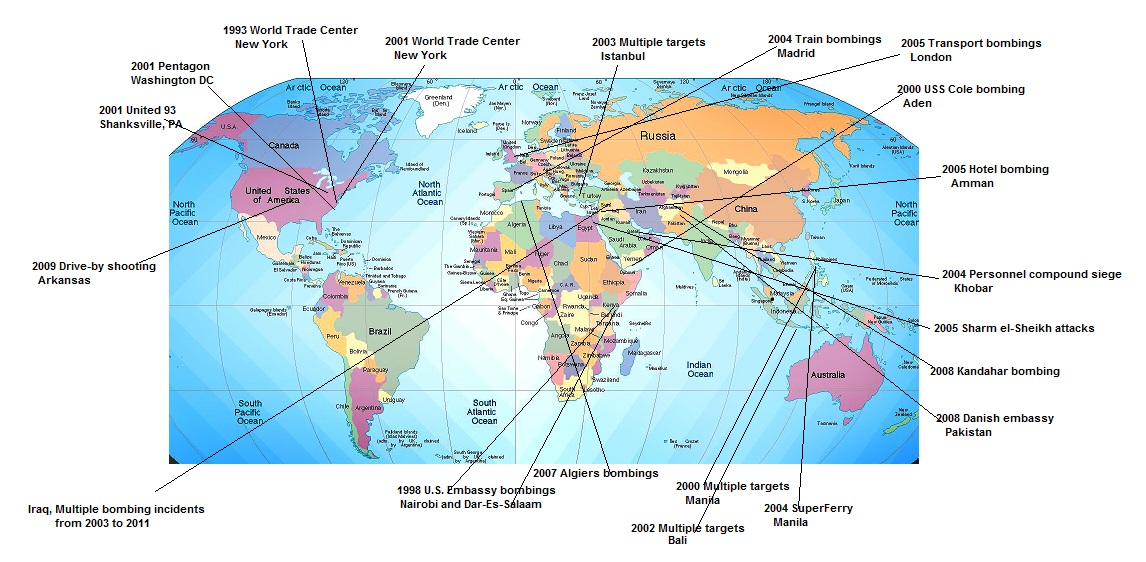
Afghanistan Coalition Fatalities

Distribution of Anti-Terror Spending
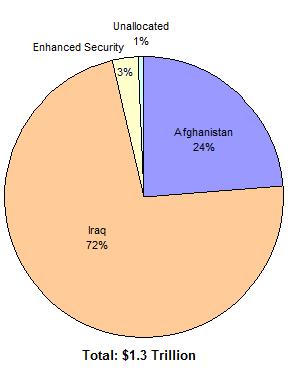
Anti-Terror Related Funding 2003-2009
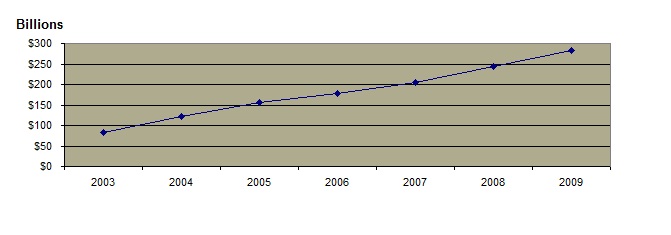
Unfavorable Opinion of the U.S. in Selected Arab Countries
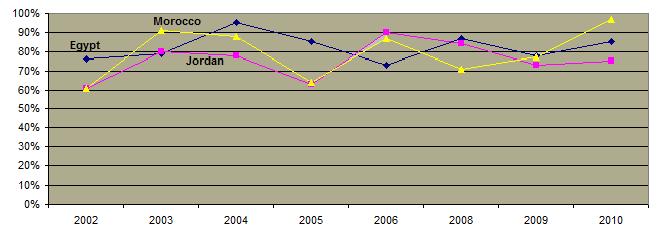
Distribution Anti-Terrorist Funding By Agency
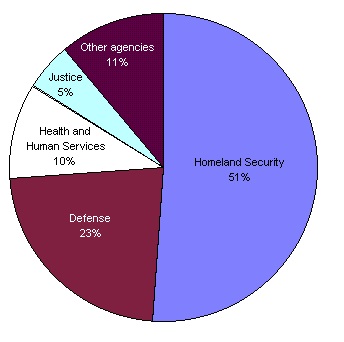
Afghanistan
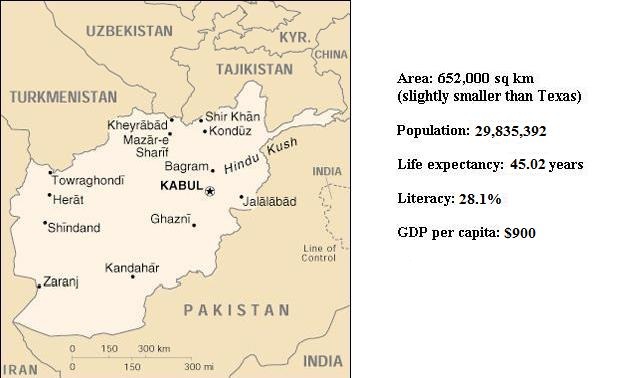
Pakistan
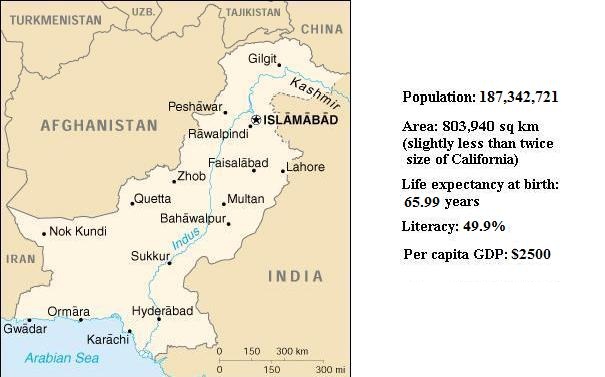
Iraq
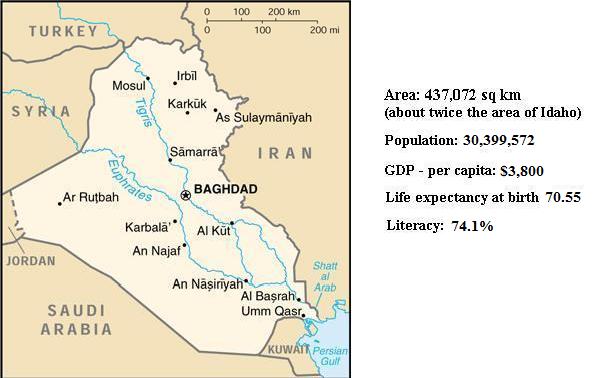
Iran
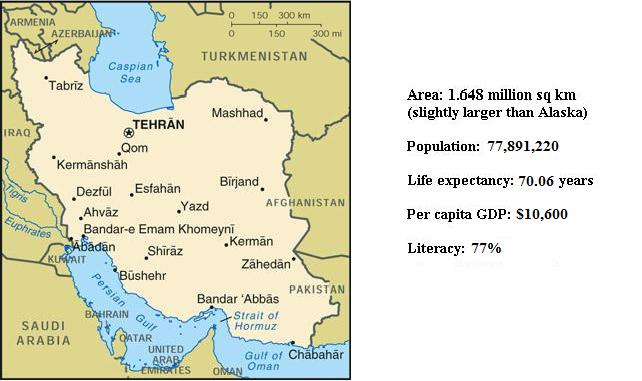
Sudan
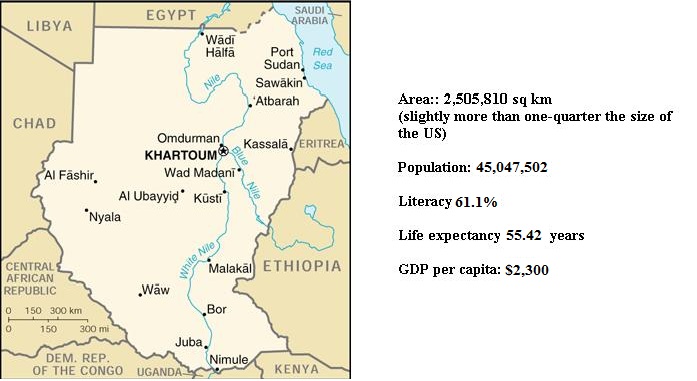
Syria
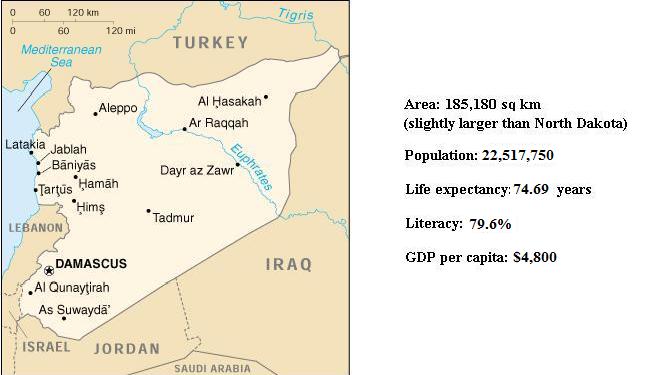
Libya
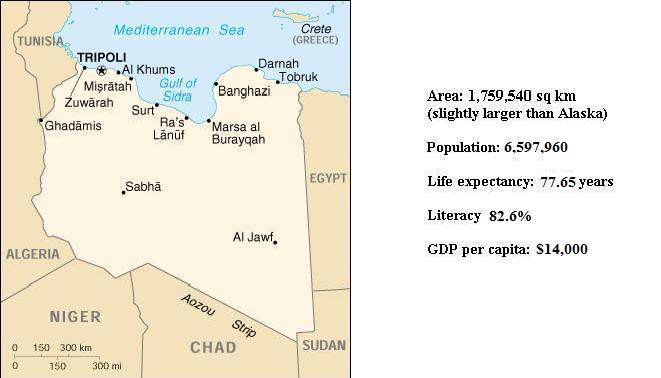
|

